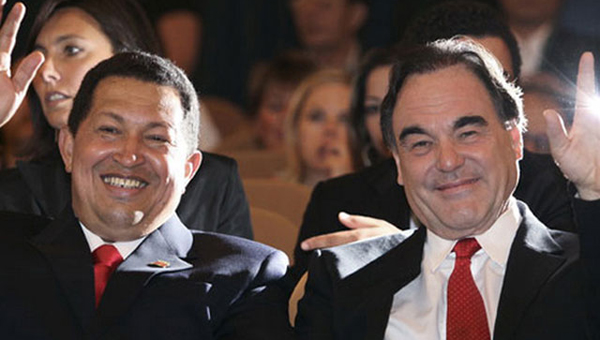South Of The Border DVD Review

Greed is good.
At least that’s what Oliver Stone’s most infamous cinematic incarnation espoused on the streets of wall.
To judge from his love of documenting all things socialist South Of The Border, its probably not a sentiment Stone buys into.
South Of The Border is Stone’s latest release and last week, as if living up to the promise of his own name, he rolled into London for a promotional tour of a film he didn’t expect to get this far.
Stone’s original ambition reached no further than releasing his interview with Venezuelan president Hugo Chavez to his country’s local tv networks.
After meeting Chavez, having debunked the demonisation perpetuated by an increasingly paranoid and reactionary section of the american media for himself, Stone was inspired to embark upon a political road movie that tells the story of neighbouring South American countries that have since elected socialist governments in the wake of Chavez’s success.
South Of The Border opens with some witless banter between three stepford coiffed presenters taken from an american tv news broadcast.
This neatly establishes both their collective inability to even read accurately from an autocue; whilst confirming the greatest modern threat to america’s way of life.
Their media.
And more accurately, the misinformation delivered by them.
Following a brief history of Chavez’s rise to power, including failed coup d’états committed by and against him, the direction settles into a modern documentary format; consisting of one on one shaky-cam interviews between Stone and his subjects, those ubiquitous talking head shots interspersed with stock news footage.
The most pertinent revelation of which was the tacit support from the west, predominantly America and Spain, for Pedro Carmona’s illegal and undemocratic coup of Venezuela in 2002.
A coup which lasted less than 48 hours, for that was all it took for the Venezuelan people to march upon the presidential Palacio de Miraflores and demand the man they had legitimately elected be reinstalled.
Interview’s with democratically elected socialist presidents of Bolivia, Brazil, Argentina, Paraguay, Ecuador and – of course – Cuba followed; illustrating the Bolivarian inspired social reform sweeping through this continent.
And the positive effects these reforms are having on the poorest people in these countries.
A revelation conspicuous by its absence from the majority of UK media outlets I read.
And herein lies South Of The Border’s raison d’être, to raise awareness of events that have taken place in South America over the last decade that western – i.e. capitalist – media outlets seem so reluctant to cover.
As with all films that choose to represent one side of an argument over another, South Of The Border leaves itself open to accusations of partisanship.
It’s difficult to accept any director, or anyone for that matter, wouldn’t be swayed by the swathe of palatial hospitality granted to them when given intimate access to the regal trappings of national office at close quarters.
Perhaps South Of The Border would have benefitted from granting President Barack Obama, or even former incumbent George W Bush, an interview in the name of even handedness.
But, in a wider context, it makes sense to marginalise western views that it’s intended audience would already be familiar with in order to give a platform to the under represented ideas of modern South American politics.
We can then decide for ourselves what we believe.
Much to the undoubted chagrin of Bacchus, truth lies in discourse.
After the film Stone talked of his ongoing project, The Secret History Of America, and his hopes that this will leave a lasting legacy for american’s bombarded with one eyed interpretations of their own history.
For a man who has achieved so much, you could accuse Stone of being greedy.
Perhaps greed can be good after all.
Jonathan Campbell